- Home
- Michael Wallace
Not Death, But Love (Quill Gordon Mystery Book 3) Page 6
Not Death, But Love (Quill Gordon Mystery Book 3) Read online
Page 6
“I know, but better safe than sorry.”
Gordon slipped Miss London’s disk into the portal on its right side. It fell into place with a loud snap, then whirred and sputtered for several seconds, finally producing an image of the disk, labeled CLDisk, on the desktop. He double-clicked on it, and a new window opened to reveal a Word document labeled History. He double-clicked on the document.
Instead of the gibberish he’d seen on the sheriff’s computer screen, the document opened on what was clearly the title page of a book. It read:
A History of the London Family
of Forest County, California
By Charlotte London
Copyright © 1996, Charlotte A. London
All Rights Reserved
Gordon began scrolling down. Everything that followed was perfectly formatted and intelligible prose. He scrolled back to the title page.
“Well?” said Peter. “What have we got?”
“See for yourself.”
He turned the computer around so Peter could see the screen.
“Well I’ll be damned,” Peter said. “The old darling was using a Mac. No wonder the sheriff couldn’t get it on his IBM.”
“Well, it looks like I have some reading to do tonight,” Gordon said.
He ejected the disk, turned off the computer, and put everything back in the case just as the waitress arrived with their pie. He ate it with pleasure, feeling, for the first time since learning of Charlotte London’s death, that he was moving in the right direction.
EMMA CRISP AND HER HUSBAND, Phil, owned Stanhope House, but Emma was in charge of the operation. Within a year of buying it, they realized that the income it generated was erratic enough that one of them should have a job. So Phil worked about 30 hours a week at Nelson’s Hardware and Sporting Goods. That provided enough of an income to cover most of the monthly essentials, plus a substantial discount on hardware and building supplies, two commodities Stanhope House consumed like a lumberjack at a breakfast buffet.
When Gordon caught her at the front desk, she was still out of sorts over the burglary of his room. Ordinarily a calm and level-headed woman, she nonetheless realized that having a guest’s room ransacked while he was out fishing was the kind of PR the Stanhope could ill afford. She greeted Gordon and Peter and apologized profusely, for the fifth time that day, for the burglary.
“Please,” Gordon said, “there was nothing you could have done about it.”
“This has only happened once in 14 years, and the last time, they caught the boys who did it. But they never recovered what was stolen.”
“Nothing was stolen here. It was a minor inconvenience.” There was an awkward pause. “Would you mind if I connected my laptop to your printer and tried to print on it? I’m afraid it’s rather a long document.”
“No, no, no. Be my guest. No charge. It’s the least we can do after what happened today. I just put 200 sheets of paper in the printer.”
“And I have about 100 to print, so we should be fine.”
The Business Center was only 20 feet from the front desk. Gordon and Peter were able to connect the laptop to the printer with only minor confusion, and soon it began to print the family history, spitting the pages out to a plastic tray. They cleared the tray every ten pages, and had got the first 30 run off when Emma, who had been at the front desk, came over.
“Sorry to bother you, but I need to get something off my chest.” Gordon and Peter looked at her expectantly. “I’m wondering if I should have told that person who called that you were staying here.”
Gordon’s poker face nearly crumbled, but he recovered quickly and said, with a slight croak in his voice:
“When was that?”
“This morning. Just before nine o’clock. We were cleaning up breakfast, and the phone rang. When I answered, the voice on the other end asked if Mr. Quill Gordon was staying here. I said yes, but that you were out fishing, and could I take a message. He said he’d call back later and hung up. No one ever called back.”
“He?” said Peter. “Are you sure it was a man?”
“I think so. I’m not sure. It was a deep voice, but sort of muffled and hard to make out. I think there was a bad connection.”
“Or somebody trying not to be recognized,” Gordon said. “Did it sound familiar at all?”
She thought hard. “There was something familiar about it, but I can’t tell you what it was. I certainly didn’t recognize the caller. Maybe it’ll come to me later.”
“Let me ask you something,” Peter said. “When would somebody have been able to come in here and go into a room without being seen?”
“There are always people around, but checkout is at 11, and I go out and run errands for an hour or two after that. If Phil’s at the store, the front desk and front rooms are pretty empty then.”
“How many people know you’re in the habit of doing that?” Gordon asked.
“Everybody who knows me and maybe some people who don’t. I always tell friends not to call between 11 and one because I probably won’t be in. I shouldn’t have told that person about you, should I?”
“Of course you should have,” Gordon said. “It might have been a family emergency or an important business matter. There was no reason to suspect that anyone was planning to rob me. Please don’t worry.”
“What should I do if I get another call?”
“Easy,” Peter said. “Ask who’s calling and write it down. Though I suppose a clever villain could make something up on the spot.”
The front desk phone rang, and she excused herself to answer it. From her end of the conversation, it sounded as if somebody was calling about booking a room and had detailed questions about the options. They turned back to the printer, which had completed its job, but because the tray had been left unattended, several dozen sheets of paper had fallen on the floor and were scattered about. Peter knelt and began picking them up.
“At least they’re numbered,” he said. “From what we know about Miss London, it would have been surprising if they weren’t.”
They were able to assemble the manuscript in a few minutes and headed upstairs. At the door to his room, Gordon asked Peter if he’d like to join him.
“Sit there and watch you reading a manuscript?” he said. “There has to be something better on cable.” Gordon laughed. “Breakfast here tomorrow, then hit the lower river?”
“You’re on,” Gordon said.
He stepped into his room, turned on the light, and froze. Methodically noting every detail, his eyes swept the room twice. Nothing seemed amiss, but he realized that for the rest of the trip, he’d be unable to enter the room nonchalantly. Emma had offered to move him to another room, but he had declined. It would be, at some level, letting the burglar win.
The room held a four-poster queen bed, covered with a locally made quilt, an antique armoire where some of his clothes were hanging, and a comfortable easy chair by the window at the far end. To the left of the entry was a nook with a small writing table and a couch for two. A standing lamp stood next the couch, and, figuring it would provide good light for the task ahead, Gordon turned it on and sat under its glow.
He began reading. What Charlotte London’s style lacked in the way of verve and elegance, it made up for in simplicity, clarity, precision, and thoughtful, succinct organization. Gordon had not expected to care much for the London family, but within a few pages he found himself getting caught up in the story.
It began with Jeremiah London, a native of Cape Cod, who had signed on for the whaling business but discovered, halfway through the second voyage, that the seafaring life was not for him. He jumped ship in San Francisco in December of 1880, only to discover that the Gold Rush, about which he had heard so much, had ended decades earlier. Working odd jobs and living frugally, he saved enough money to enable him to head for the mountains in May 1882.
He landed in Arthur, which had become a boomtown providing lumber for the railroad being built through the mountains
to the south. The Empire Lumber Company happened to need of a bookkeeper at the time. Having a bit of experience in that line (though not as much as he told the superintendent), he got the job and was soon put in charge of all financial operations. Flush with prosperity, he wooed and won Dorothy Manchester, the formidable teacher at the local school. On their wedding day in August 1885, he was 31 and she was 35; she gave him three strapping boys in the next five years.
Their names were, in order, Matthew, Mark and Luke. Luke volunteered for the Army in World War I, went to France, and found a final resting place in one of the large cemeteries resulting from that conflict. Mark moved to San Francisco, never married, and died of tuberculosis at the age of 42. Matthew London, however, remained in Forest County and became one of its leading lights.
He was elected sheriff in 1924 and served six terms before retiring in 1948. By Charlotte’s account, he was universally respected, serving on the school board, the library board, the fire board, and anything else anyone could think of to ask him to do. He married Ruby Jensen, daughter of the general store’s owner, and they had two children, Edward and Pearl. Edward, known as Ned, was born in 1912, married Lydia Dawson in 1934. They had two children: Charlotte Ann was born in 1935 and Gregory two years later. Ned went into real estate and prospered, especially when the postwar creation of Lake Año Nuevo began to make the area a summer vacation destination.
That took the manuscript to page 65 and the clock to 10:15. So far, Gordon thought, there was nothing remotely scandalous in the document. In fact, in the hands of a less competent writer, it could have been downright boring. The remaining 35 pages seemed to be one long chapter. He decided to take a break, make a cup of herbal tea downstairs, and finish before falling asleep, if he could.
The sun had been down for an hour and a half, and it had cooled off outside. The ancient timbers of Stanhope House, which had expanded with the midday heat, were beginning to contract, resulting in a variety of intermittent squeaks, groans and thumps. An owl hooted from a nearby tree. Through the open second-story window, Gordon could hear something, probably a dog, rustling and shuffling in the yard below. A car drove past on the highway, and he could track its passage by the sound it made. A whisper of wind kicked up, and he could feel the breeze through the window and hear it caressing the leaves of the aspen trees. He stood, stretched, and headed for the door.
When he put his hand on the knob, he paused. After several seconds, he walked back to his computer case, which was on top of the bed, removed Miss London’s floppy disk, and stuck it in his side pants pocket. Ordinarily, he would not have locked the door when leaving for a few minutes, but tonight he did. The hallway was well lit, and he enjoyed the feel of its thick carpet against his bare feet. The stairs leading to the ground floor had a landing halfway, and he stopped on it to look and listen. A couple of small table lamps had been left on, leaving the downstairs area in dim, but navigable light. There seemed to be no one stirring, but the owl hooted again.
He walked down the rest of the stairs, through the main sitting room (where tables against the walls were set for tomorrow’s breakfast) to the guest pantry, next to the kitchen. It was dark, but he reached out with a long arm and flipped on the light switch just inside the entryway. The light illuminated a small area, with a countertop holding trays of tea, cocoa and fruit, a two-burner stove with a teakettle and saucepan on its burners, a sink and a refrigerator. He drew a pint of tap water into the saucepan and turned on the burner underneath it. Rummaging through the teas, he found a box of Celestial Seasonings Sleepytime and put a bag into a Styrofoam cup. The water came to a boil, and he poured it over the tea bag, leaving it to steep for a few minutes.
The house — at least he assumed it was the house — made a noise unlike any he had heard before.
Gordon couldn’t place what was different about the sound — just that something was. He tensed up, all senses heightened. Another car drove by on the highway, and he could hear the sound of its tires on the pavement for a full 20 seconds. He listened, and hearing nothing out of the ordinary for a couple of minutes, concluded his imagination was beginning to run riot. Removing the tea bag from the Styrofoam cup, he squeezed in a half-lemon he’d found in the refrigerator, and started back to his room, turning out the pantry light.
He stopped after doing that, and took a long look at the sitting room. Nothing seemed out of order, but it occurred to him that the lights inside kept him from seeing anything through the windows. Someone could be on the veranda outside, watching his every move. He tried not to think about it as he walked to the stairs and started up, stopping again at the landing to look and listen before continuing to the second floor. He let himself into the room as quickly as possible, and locked the door once inside.
When he turned to survey the room, everything looked as it had when he had left to go downstairs. The manuscript was on the writing table, the read portion turned upside down and the last chapter face up. He picked up that chapter and sat down on the couch, but, before starting reading, looked around the room one more time.
The armoire.
There was enough space in it to conceal someone, and for a moment his mind flashed on the idea of those French bedroom farces, in which various lovers are concealed about the room as others come in. But he wasn’t laughing. Now that the idea was in his head, he had to look. Quietly, he moved over to it and yanked the door open. There was nothing in it but his Spartan holiday wardrobe.
At least, he thought, as he sat on the couch again, he would be able to stay awake through the final chapter. In fact, he wondered if he would get to sleep at all that night.
The last chapter turned out to be a departure from the rest of the manuscript, and Gordon found himself drawn into it. It had to do with the development of the Lake Año Nuevo Peninsulas, in which it turned out Charlotte’s father had played a leading role.
Before building the dam across Hawk River to create the lake in 1947, Pacific Crest Hydro had bought up the land that would be flooded. This included a near-ghost town called Conkling a couple of miles south of Arthur, whose residents received top dollar for their not-so-valuable land. The company had also bought the land that was now the Peninsulas, with the idea that it might some day add a smaller barrier across the creeks that ran past them.
Two decades later, that was no longer an option, and Pacific Crest Hydro decided to sell the Peninsulas and some adjacent shoreline land. In the summer of 1969 it announced there would be a sealed-bid auction, with bids opened Friday October 24. It was a choice bit of land, expected to command top dollar. Several Bay Area development consortiums were interested, and it was expected one of them would make the winning bid.
But Ned London had other ideas. He joined forces with a fellow real estate man, a friendly competitor named Roger Paris. They formed a limited partnership called the London & Paris Land Company and set to preparing a bid. London’s insight, critical to the enterprise, was that as locals they could better assess the development potential of the land and could more likely get a larger project approved by the county’s Board of Supervisors. Holding that edge, they might be able to outbid their big-city competitors for the property.
That was what happened. The London & Paris bid was highest by $10,000, and nine months later, in August 1970, they submitted a plan to the county for a 550-home subdivision, a golf course, several commercial areas, two resorts and a marina.
And then the Peninsulas became a campaign issue. When the plan was filed with the county, the Board of Supervisors looked to be in favor of it by a four-to-one margin, with one young supervisor, Bart Sturges, apparently opposed. Two of the board members supporting it were up for re-election in November and were expected to win easily. But the project had begun to divide the community. Some felt it would bring growth and prosperity to the area; others that it would destroy the rustic character of Lake Año Nuevo and make the community too heavily dependent on tourism. The incumbents’ challengers sided with the opposition to the pr
oject, and both of them narrowly won in November and assumed office Tuesday January 5.
The London & Paris development came before the Board of Supervisors on Tuesday, January 19, 1971, seemingly headed for defeat. The supervisors’ chambers were filled to capacity when the public hearing began at 11 a.m., and dozens of people stood outside in a blizzard, waiting for their turn to testify. With breaks for lunch and dinner, the hearing ran until 2:15 a.m. the following day, which was when the last person testified.
At that point, the supervisors stated their reasons for the vote they were about to cast, and after four of them had spoken, the count was 2-2. Bart Sturges was the final speaker, and to the surprise of almost everyone in the audience, he announced that he would vote yes, citing the standing arguments of the growth and prosperity proponents. The development passed on a 3-2 vote, and fights broke out in the chamber, forcing sheriff’s deputies to clear the room.
In the paragraph summarizing Sturges’ speech, Charlotte London had written at the end, in brackets and italics, Seems weak. Need to interview. From what he had read to that point, Gordon was inclined to agree. Something else was tickling the back of his brain — he was sure he had encountered Bart Sturges before. After a minute it came to him. Several years ago, when his father was up for re-election as judge, he faced a challenge for the first time. He won with 78 percent of the vote, but at one of the fund-raisers Gordon attended, he’d met a State Senator named Bart Sturges. It was an uncommon enough name that it almost certainly had to be the same man.
Only a couple of pages remained, and Gordon began reading again:
“But Ned London was not to enjoy his unexpected triumph. On the night of Wednesday January 13, six days before the vote, he was killed when his car skidded off the state highway a little after ten o’clock and tumbled down a hundred-foot embankment, landing on boulders at the edge of the lake. The incident was recorded as an accident arising from an icy roadway, but the accident report, retrieved from Highway Patrol files, contains ambiguities and omissions. [Add A.D. interview.] His son, Gregory, and the Paris family (Roger, Robert, Ronald and Richard) represented him at the public hearing.”

 Crowlord (The Sword Saint Series Book 2)
Crowlord (The Sword Saint Series Book 2) Crowlord
Crowlord The Red Sword- The Complete Trilogy
The Red Sword- The Complete Trilogy Wandering Star (The Quintana Trilogy Book 1)
Wandering Star (The Quintana Trilogy Book 1) Bladedancer
Bladedancer Sword Saint
Sword Saint The Alliance Trilogy
The Alliance Trilogy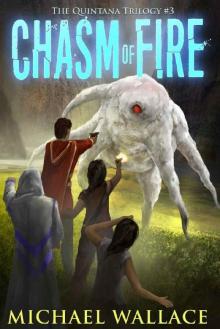 Chasm of Fire
Chasm of Fire Bladedancer (The Sword Saint Series Book 4)
Bladedancer (The Sword Saint Series Book 4) The Devil's Deep
The Devil's Deep Shadow Walker (The Sword Saint Series Book 3)
Shadow Walker (The Sword Saint Series Book 3) Starship Blackbeard
Starship Blackbeard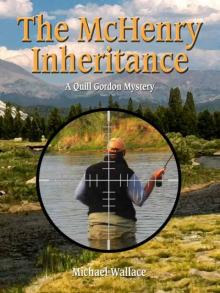 The McHenry Inheritance (Quill Gordon Mystery Book 1)
The McHenry Inheritance (Quill Gordon Mystery Book 1) Sun King (The Void Queen Trilogy Book 3)
Sun King (The Void Queen Trilogy Book 3) Blood of Vipers
Blood of Vipers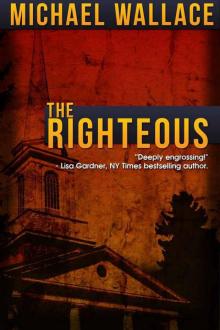 Righteous - 01 - The Righteous
Righteous - 01 - The Righteous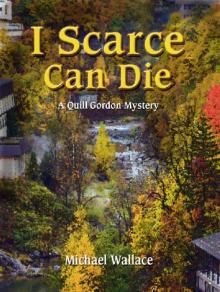 I Scarce Can Die (Quill Gordon Mystery Book 5)
I Scarce Can Die (Quill Gordon Mystery Book 5) The Devil's Cauldron
The Devil's Cauldron The Wicked (The Righteous)
The Wicked (The Righteous)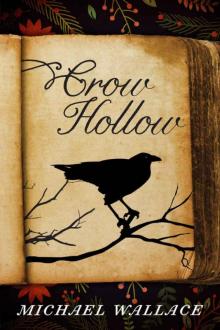 Crow Hollow
Crow Hollow Righteous03 - The Wicked
Righteous03 - The Wicked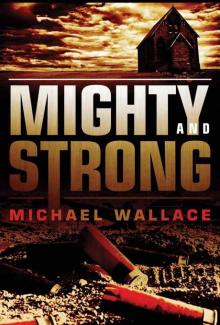 Righteous02 - Mighty and Strong
Righteous02 - Mighty and Strong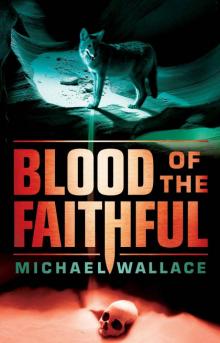 Blood of the Faithful
Blood of the Faithful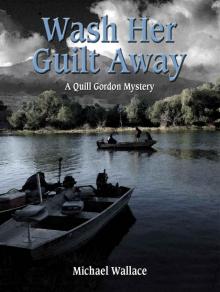 Wash Her Guilt Away (Quill Gordon Mystery Book 2)
Wash Her Guilt Away (Quill Gordon Mystery Book 2) The Kingdom of the Bears
The Kingdom of the Bears The Emerald Crown (The Red Sword Trilogy Book 3)
The Emerald Crown (The Red Sword Trilogy Book 3) The Dark Citadel
The Dark Citadel The Warrior King (Book 4)
The Warrior King (Book 4) Rebellion of Stars (Starship Blackbeard Book 4)
Rebellion of Stars (Starship Blackbeard Book 4)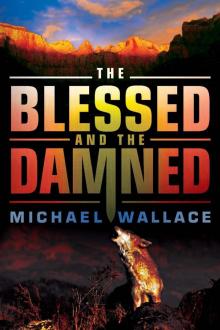 Righteous04 - The Blessed and the Damned
Righteous04 - The Blessed and the Damned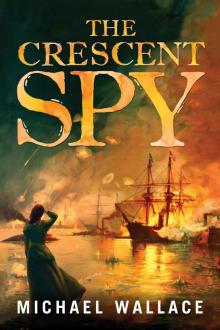 The Crescent Spy
The Crescent Spy Queen of the Void (The Void Queen Trilogy Book 1)
Queen of the Void (The Void Queen Trilogy Book 1) The Red Sword (The Red Sword Trilogy Book 1)
The Red Sword (The Red Sword Trilogy Book 1) The Sentinel (The Sentinel Trilogy Book 1)
The Sentinel (The Sentinel Trilogy Book 1)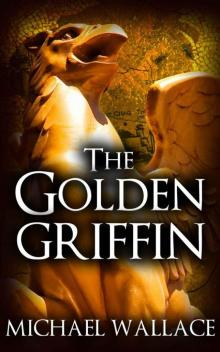 The Golden Griffin (Book 3)
The Golden Griffin (Book 3)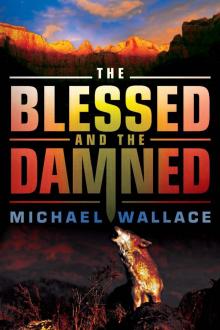 The Blessed and the Damned (Righteous Series #4)
The Blessed and the Damned (Righteous Series #4) Hell's Fortress
Hell's Fortress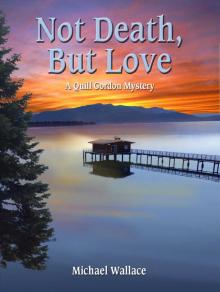 Not Death, But Love (Quill Gordon Mystery Book 3)
Not Death, But Love (Quill Gordon Mystery Book 3) Destroying Angel
Destroying Angel The Free Kingdoms (Book 2)
The Free Kingdoms (Book 2) Dragon Quadrant (The Sentinel Trilogy Book 2)
Dragon Quadrant (The Sentinel Trilogy Book 2) Shattered Sun (The Sentinel Trilogy Book 3)
Shattered Sun (The Sentinel Trilogy Book 3)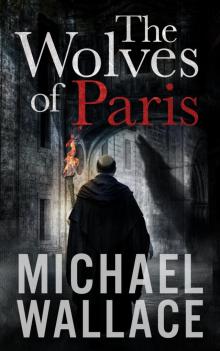 The Wolves of Paris
The Wolves of Paris Lords of Space (Starship Blackbeard Book 2)
Lords of Space (Starship Blackbeard Book 2) Dreadnought (Starship Blackbeard Book 3)
Dreadnought (Starship Blackbeard Book 3)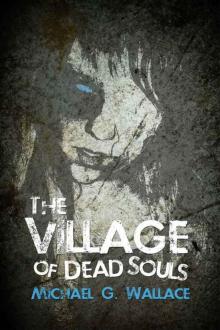 The Village of Dead Souls: A Zombie Novel
The Village of Dead Souls: A Zombie Novel The Black Shield (The Red Sword Book 2)
The Black Shield (The Red Sword Book 2)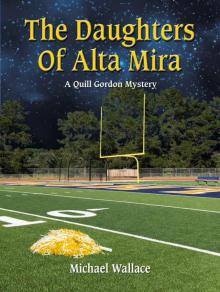 The Daughters Of Alta Mira (Quill Gordon Mystery Book 4)
The Daughters Of Alta Mira (Quill Gordon Mystery Book 4) Mighty and Strong (The Righteous)
Mighty and Strong (The Righteous)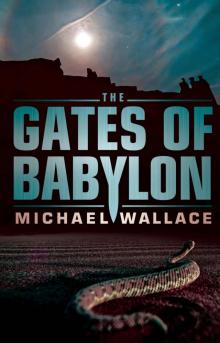 The Gates of Babylon
The Gates of Babylon